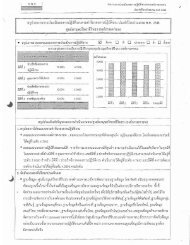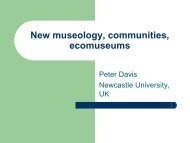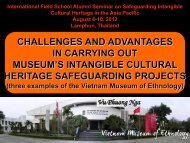SAC News:Introducing the Culture and RightsForum at the SACby Alexandra DalferroIn the month of October at the Princess MahaChakri Sirindhorn Anthropology Centre, researchers andproject staff have traveled across Thailand, delved deep intoarchives, and designed and updated databases. Dr. TrongjaiHutangkura, leader of the SAC’s Publicity and NetworkingDivision, has been teaching himself to read and write theancient Thai alphabet of the Sukothai period so that hecan better understand the manuscripts he researches. TheBarefoot Anthropology team spent a week in Mae Hong Sonlending support to Karen villagers as they developed culturalsafeguarding activities. Dr. Narupon Duangwises hosted aseminar on sexuality called “Handsome Gay Kings: When GayMen Long for Masculinity.” These are only a few examplesof the diverse events and processes that occur at the SACon a monthly basis, and they illustrate the organization’s vastscope of interest and engagement. What, then, do theseprojects have in common? How can they be related to oneanother in ways that illuminate shared themes and challengeand enrich objectives and methods? The recently launchedCulture and Rights Forum attempts to address these questionswhile introducing core concepts of cultural rights to SAC staff.The forum will also emphasize how research, documentation,archiving, and communicating on cultural issues need to takeinto consideration the rights of source communities.The Culture and Rights project commenced in 2009as a multi-sited, field-based research initiative for Thai andinternational scholars. As the research progressed, ProjectDirector Dr. Alexandra Denes and Project Advisor Dr. CoeliBarry realized that the ideas and discourse surrounding cultureand rights resonated implicitly with the work of the SAC, andthey wished to draw out and interrogate these embeddedconcepts along with SAC staff. They envisioned a structurethat would allow sustained commitment to the discussion ofculture and rights at the SAC, thereby creating a space forcontinual reflection and institutional identity building. Aftermuch careful planning, the Culture and Rights Forum wasborn. For the next ten months, through June 2013, SAC staffwill meet at least once a month for half-day sessions to4discuss issues ranging from sexuality rights to communityinvolvement in and access to digital heritage. Forum FacilitatorJan Boontinand, a PhD candidate at the Institute for HumanRights and Peace Studies of Mahidol University with manyyears of experience working with Thai NGOs, will guide eachsession, helping to stimulate dialogue that links material frompresenters back to the work of the SAC. Dr. Barry affirms thatthe forum can also be referred to as a “laboratory,” as shewishes to highlight the unique, experimental nature of thisprogram. It is Dr. Barry’s hope that the opportunities the forumwill provide for reflexivity, communication, and connection willstrengthen the SAC’s thematic framework and enable staffto solidify around a more collective identity.The first Culture and Rights meeting was held onSeptember 26th. Participants began by sharing aspects oftheir work that make them feel passionate as well as theirexpectations for the forum. Dr. Barry then gave a generaloverview of the concept of cultural rights and presented herthoughts on Michael Brown’s introduction to his book, WhoOwns Native Culture? Brown explores the operationalizationof cultural rights theories by indigenous groups who haveused this rhetoric to call for repatriation of sacred objectsand control over cultural meanings and replication. Fearingthat the procedures and strategies surrounding these claims,not to mention the cultural forms in question, will becomeincreasingly standardized and codified via intellectual propertylaws, Brown decries practices of litigation and legislation thatturn culture into property and instead advocates approachesthat establish the inherently relational, context-dependentnature of the ownership problem. In his reaction to the forumso far, Chewasit Boonyakiet, a research assistant at the SAC,echoes Brown’s concern, “In Thailand, we don’t really usethe vocabulary of rights yet – we refer to it as heritage that
elongs to certain groups. When claims are made, there isnot a process in place for responding to them. We need tocome up with a multifaceted method - one that does not onlyemphasize community rights, or mainstream museologicalprinciples, for example - but is nuanced and case-specific.”SAC staff wrestled with the ideas of Brown asthey divided into small groups to brainstorm examples ofcultural rights-claiming behaviors in Thailand. Discussionsof the Assembly of thePoor protest of 1997,Yong language andidentity revitalizationin Lamphun, and theMinistry of CulturedesignatedKarenSpecial Cultural Zoneled to exchange about ownership and the managementof the SAC’s digital resources, as substantial amounts ofresearch are made available to the public through onlinedatabases. How can resources be designed and circulatedin ways that involve source community members as decisionmakersand key users of materials? What if the database inquestion contains ancient Buddhist inscriptions that initiallyseem far-removed from original creators and users? Dr.Hutangkura, who has played a large role in developing theInscriptions in Thailand Database, elaborates, “Now I amthinking about the true owners of the inscriptions. Are theowners the museums and researchers, or are the ownersthe temples where the inscriptions were created, along withthe the surrounding communities that still attach meaning tothese documents? And in what context do the manuscriptsbelong? How can they be distributed so that they are notabused and copied without permission? Many times themanuscripts have been copied without official permissionfrom the temples, and we still don’t have clear laws andregulations about these matters.” Dr. Hutangkura touches onissues that are at the crux of the culture and rights debate,issues that will continue to be deconstructed at subsequentCulture and Rights gatherings.At the second meeting on October 16, Dr. Barryand Ms. Boontinand structured the session around tworeadings that came from presentations made by ElsaStamatopoulou and Richard Wilson at the 2004 CarnegieCouncil. Stamatopoulou attempts to answer the question,“Why cultural rights now?” by outlining international protectionBefore staff at the SAC can integrateculture and rights ideas into projects orshare relevant insight with communitymembers, we first must be able tomake culture and rights meaningful andcomprehensible within our own institution.mechanisms and pointing to the rise in racism, xenophobia,and intolerance across the world, in addition to theemergence of new technologies that facilitate communicationfrom previously-unheard-from source communities. WhileStamatopoulou is a firm believer in the potential of internationalhuman rights instruments to imbue cultural rights with politicalsaliency and mend age-old injustices, Richard Wilson arguesthat the conception of culture upon which these instrumentsare founded is essentialist andflawed. He posits that cultureis only useful as a concept forthinking about society when itis viewed as a transformative,fluid, and open system, whichstands in direct contrast withthe bounded, categorizedconfigurations of culture recognized by Stamatopoulou’s legalframeworks. According to Wilson, the state has no place incultural matters. How can these antithetical perspectivesbe productively reconciled? And how do they apply to theways that the SAC defines culture and assesses the utilityof cultural rights?Perhaps we can begin to answer these questionsby approaching them with knowledge of vernacularization.This concept, advanced by anthropologist Sally Merry, isused to describe the process of appropriation and localadoption of globally generated ideas and strategies. Beforestaff at the SAC can integrate culture and rights ideas intoprojects or share relevant insight with community members,we first must be able to make culture and rights meaningfuland comprehensible within our own institution. This multilayeredvernacularization cannot be accomplished withoutan in-depth understanding of all projects and initiativesencompassed by the SAC, and the forum seeks to providespace and support for such exchange and enhancement.Feedback from the first two meetings is encouraging, andDr. Barry asserts, “I feel hopeful. It seems like a lot of peopleare willing to participate actively and make the connectionsbetween their work, these ideas, and what the Centredoes. It feels very positive and I think we have achieveda consensus on the value of the forum.” The Culture andRights Forum places the SAC in an exciting position tocontribute to the dialogue on the possibilities and parametersof vernacularizing rights that surround heritage & identity,while continuing to develop and evolve as an institution.5







